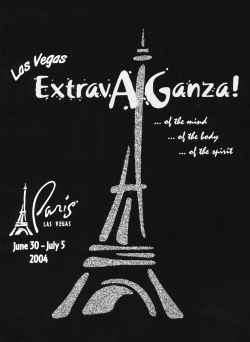AMC Agenda Alert
[EDITOR'S NOTE: Although the December 2003 AMC meeting has already occurred, this article is published to make readers aware of what was to be discussed. Meeting minutes are usually not immediately available, so if something in this article causes you concern, contact your RVC to ask him/her what did occur. GF's editor apologizes for the lateness of this report, which was entirely her fault and not that of the commentators.]
The agenda for the December 2003 AMC meeting begins with these words, captioned "American Mensa Mission":
The mission of American Mensa is to identify and foster human intelligence for the benefit of humanity by encouraging research in the nature, characteristics, and uses of intelligence and by providing a stimulating intellectual and social environment for its members.
It occurs to your trusty commentators that a good deal of trouble could be avoided by simply bounding the actions of the society and its officers by that simple statement.
The agenda has a new format for this meeting. Section C is titled "Consent Agenda," about which more will follow.
In subsection C5, "Unfinished Business," we find an item that is by now familiar to readers of this column (AAA) and its sibling "AMC Minutes Capsule."
1. Moved Communications Services Committee and Membership Committee that for the purposes of campaigning AML shall release member contact information only to candidates for AML office.
EXPLANATION: This has now been discussed by the International General Counsel.
This anonymously presented motion is, sadly, still not dead. If you believe, as some of your AMC officers do, that contact between members should become ever more constricted by rules and officially mediated, then feel free to ignore this subject.
In subsection C6, "Routine Matters," appears this item:
3. Moved BRUCE, seconded BEATTY, COONTZ, FOLKS and MCBEAN that:
a) ASIE 1995-026 be amended to read:
b) ASIE 1999-018 be amended to read:
EXPLANATION: This motion decouples the deadlines for officer and committee reports from those for agenda items. The policy of distributing the advance agenda at least 30 days before most AMC meetings remains unchanged, but this motion allows the report deadline to be moved closer to the meeting dates in an effort to reduce oral updates to officer and committee reports at the meeting.
This motion gets a mixed review. In theory it would accomplish the apparent underlying purpose of shortening AMC meetings. In fact, however, it removes any deadline for receipt of officer reports. That could increase the amount of oral reporting! In the interest of maximizing the flow of information, "AAA" suggests first leaving the report deadline alone. Second, distribute to LocSecs and editors full reports that include any late updates after the meeting, along with the minutes.
Next, we consider two items together. The first (4) is from subsection C5; the second (1) from section E, "Emerging Issues."
4. Moved VASILIAUSKAS, seconded BURG:
ASIE 2000-126 is amended by deleting "Actions Still in Effect" in the last sentence and replacing it with "Standing Orders."
ASIE 2000-127 is amended by deleting "Actions Still in Effect" in the last sentence and replacing it with "Standing Orders."
ASIE 1985-086, AMC Principles of Conduct, is amended by deleting "actions still in effect" and replacing it with "standing orders" in the last sentence of the first paragraph.
EXPLANATION: The list of AMC actions currently entitled "Actions Still in Effect" is being renamed "Standing Orders." This motion amends three ASIEs to reflect the new name.
1. Actions Still in Effect/Now Standing Orders VASILIAUSKAS Discussion of Standing Orders: What is the purpose of this document and how do we envision it changing in order to be more useful?
Here we have a change being made without an apparent, or at least stated, purpose. Perhaps a better way to shorten AMC meetings without limiting or obscuring officer reports would be to reduce the number of ambiguous and/or insufficiently thought-out motions.
A few paragraphs back we noted the new term "consent agenda." Here is where the rubber meets the road:
6. Moved BECKER seconded VASILIAUSKAS: That the Consent Agenda reports are received and motions are approved.
Chair's Note: This motion includes receiving the reports and adopting the motions in the consent agenda section as a block, with no discussion necessary. The Consent Agenda is intended to minimize the time required for handling non-controversial matters and permit additional time for decisions that require more discussion.
Any AMC member may request an item be pulled from the Consent Agenda AFTER discussing it with the appointee or committee chair, staff person, and AMC liaison (if any). This should be done BEFORE the weekend of the AMC meeting except in rare instances, such as a result of committee meeting decisions the night before the AMC meeting.
This motion has incredible flaws. "AAA" is led to speculate that it will be moved to the front of the agenda at the meeting. That way, any reflection upon the issues involved in those motions affected can be run over simply by an omnibus.
The "Chair's Note" makes matters worse. Who is to decide which motions are "non-controversial"? The note goes on to say that any AMC member may "request" the removal of an item from the Consent Agenda. There is no process mentioned for approving this request. Who decides and on what basis? An answer of sorts is provided by the motion that precedes this one.
5. Moved VASILIAUSKAS, seconded COONTZ, that ASIE 2000-017 be rescinded and replaced by the following:
AMC shall be guided by and conduct itself according to the Tenth Edition of Robert's Rules of Order Newly Revised , modified to permit the Chairman to speak, vote, and to make motions only concerning appointments and agenda approval, and to permit the Parliamentarian to speak, vote and make motions.
EXPLANATION: (Added "and agenda approval") This is to permit the Chairman to make the motion regarding agenda approval, which includes the Consent Agenda, since the Chairman and the Secretary are the only ones familiar with the entire Agenda prior to AMC distribution of same.
This further extends the reach of the Chair in having direct control over how the society is run. The potential for abuse of this mechanism is extreme.
|

